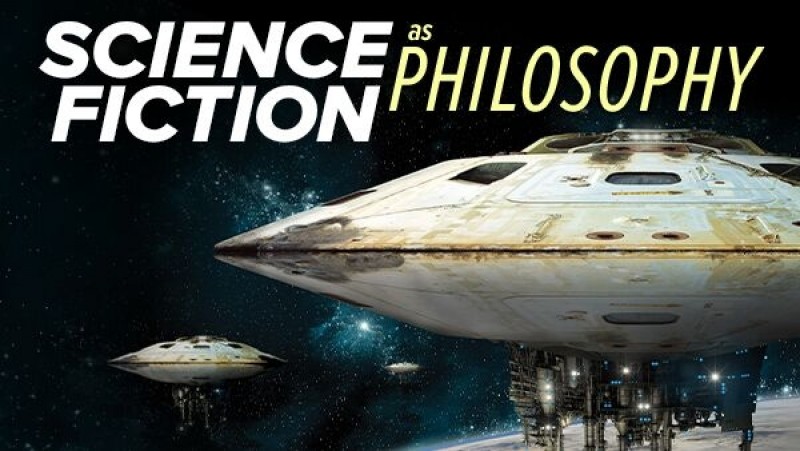🌟 New Year Offer 🌟
Celebrate 2026 with 30% OFF on all products! Use code: NEWYEAR2026. Hurry, offer ends soon!
Certainly, as Professor Johnson makes clear, tales of simulated worlds and synthetic intelligence can appear far-fetched, however they really supply invaluable File measurement: 8.34 GB
TTC / TGC – Sci-Phi – Science Fiction as Philosophy

The science fiction style has change into more and more influential in mainstream common tradition, evolving into one of the vital participating storytelling instruments we use to consider expertise and think about the form of the longer term. Alongside the best way, it has additionally change into one of many main lenses we use to discover necessary philosophical questions.
Disguise Full Description
The origins of science fiction are most frequently thought to hint to Mary Shelley’s novel Frankenstein, a narrative born from an evening of spooky story-telling by the fireplace that explores scientific, ethical, and moral questions that had been of nice concern within the nineteenth century—and that proceed to resonate right now. And, though novels and brief tales constructed the foundations of science fiction, movie and tv have emerged as equally highly effective, experimental, and satisfying methods to expertise the style. Even as far again as the silent period, movies like Fritz Lang’s Metropolis have used science fiction to inform tales that discover many aspects of human expertise.
In Sci-Phi: Science Fiction as Philosophy, Professor of Philosophy David Kyle Johnson of King’s Faculty takes you on a 24-lecture exploration of the ultimate frontiers of philosophy throughout a number of a long time of science fiction in movie and tv. From huge-price range blockbusters to tv collection that includes aliens in rubber masks, Professor Johnson finds meals for philosophical thought in a variety of tales. By critical questions by way of astonishing tales and astounding applied sciences, you will notice how science fiction permits us to contemplate immense, important—and generally controversial—concepts with a uncommon mixture of engagement and significant distance.
The Future Is Now
Science fiction is usually involved with the longer term, getting used not solely as a device of prediction—people are notoriously unhealthy at precisely predicting the longer term—but in addition as one among extrapolation and interrogation. Quite than merely asking what the longer term will appear like, the futuristic visions of sci-fi TV, like Star Trek, Firefly, and even the animated comedy Futurama, supply compelling statements about humanity’s hopes, goals, and fears. We will, due to this fact, use fictionalized futures to raised perceive right now’s world.
Setting a narrative sooner or later—or in an alternate actuality, or on a faraway planet—additionally permits sci-fi creators to open up the realm of risk past what our present world affords, whereas additionally very actual scientific potentialities. As you have a look at sci-fi movies like Arrival and Interstellar, Professor Johnson highlights the sorts of points price contemplating if contact with extraterrestrial life or time journey grew to become a part of our actual-life expertise. And even when these experiences stay within the realm of fiction, contemplating them nonetheless supplies perception into necessary philosophical questions. Certainly, all through the lectures of Sci-Phi, you’ll ponder many questions which have involved philosophers for hundreds of years, together with:
Do people actually have free will?
Might machines at some point be aware? Or be sentient?
Might we truly be residing in a simulated world?
How will humanity confront a way forward for diminished sources and advancing expertise?
Are science and faith suitable?
When, if ever, is struggle justified?
How do we all know what info to belief and what to dismiss?
Exploring Actuality by way of Fiction
Staples of science fiction like time journey, alternate universes, and extraterrestrial life are endlessly fascinating concepts to discover. But, regardless of the insights they may give us, they might not appear very related to on a regular basis life. Even our conception of actuality—what’s actual and what isn’t—can have little bearing on the extra mundane points of residing from everyday. However science fiction, for all its futurism and outlandish prospers, isn’t restricted to those theoretical ideas; it is usually a window into essential discussions concerning the right here and now, questions regarding ethics, energy, faith, tolerance, social justice, politics, and the various sensible dimensions of residing in a world that’s continually altering and eternally presenting people with recent new dilemmas to unravel. And by eradicating us from actuality, sci-fi may take away our biases and make us see such points anew.
Certainly, as Professor Johnson makes clear, tales of simulated worlds and synthetic intelligence can appear far-fetched, however they really supply invaluable insights into social and moral points which may be extra instant and related than they first seem. By them by way of fiction, we are able to take a step again and get a clearer image of the bigger implications. For example, by characters like Commander Knowledge in Star Trek: The Subsequent Era or the Cylons in Battlestar Galactica, we’re pressured to surprise: If we create synthetic intelligence that achieves true sentience, how will we deal with these man-made beings? Will we repeat the sins of the previous by enslaving them or will we embrace them as our equals? If we’re ever capable of re-create a convincing model of the world by way of computer systems, as movies like The Matrix and The Thirteenth Ground recommend, do the lives lived in these simulations imply lower than these within the “real” world? The solutions to those questions—and plenty of others—converse volumes about human values and, given our ever-evolving expertise, might require solutions sooner slightly than later.
Get instantly obtain TTC / TGC – Sci-Phi – Science Fiction as Philosophy
You might be stunned to see how typically a science fiction story can “trick” you into occupied with questions and ideas you might have by no means thought of. Exhibits like The Twilight Zone and Black Mirror overtly current questions and points for audiences to ponder. Nevertheless, whereas different movies and tv reveals could seem to focus extra on the journey and leisure worth of science fiction, they nonetheless typically have deep philosophical dimensions. Take into account the lengthy-working British TV collection Physician Who. A beloved icon of science fiction, the present has at all times been framed as merely the thrilling weekly adventures of a time-touring alien; but, all through its a long time on tv, it has explored problems with autonomy, sentience, pacifism, colonialism, racism, grief, morality, and way more.
A Distinctive View of Philosophy
Whereas every lecture of Sci-Phi focuses on a couple of key movies or tv episodes, additionally, you will discover dozens of different motion pictures and TV episodes alongside the best way. Likewise, every philosophical idea you discover opens the door to additional discovery. All through the lectures, you’ll be launched to the concepts of nice thinkers like Descartes, Hobbes, Locke, Marx, Nietzsche, Sartre, Turing, Baudrillard, and plenty of others; and thru these concepts, you’ll higher perceive the other ways philosophy examines the massive questions, from metaphysics and epistemology to existentialism and ethics.
Followers of the style will discover their expertise of sci-fi tales enriched by layers of philosophical inquiry that reveal every story to be way more than simply leisure. Equally, those that are in search of an exciting and accessible introduction to philosophy shall be equally rewarded by Professor Johnson’s breadth of information, as effectively as his deep and abiding love for each science fiction storytelling and philosophical exploration. As you have interaction with philosophy by the use of sci-fi tales for screens each giant and small, you will need to remember the fact that Professor Johnson is not going to draw back from revealing key plot factors in most of the tales he explores all through the lectures; so, though it isn’t required, watching the movies and TV episodes on the coronary heart of every lecture is beneficial. Offered as a one-on-one dialog and enlivened by enjoyable visible references to most of the tales you’ll encounter, Sci-Phi: Science Fiction as Philosophy is a philosophy course in contrast to some other.
Whether or not telling tales of far-flung futures or investigating the right here and now, science fiction is a useful supply of mental and imaginative exploration. From the style-defining classics like Star Wars, Physician Who, 2001: A Area Odyssey, and The Twilight Zone to a brand new wave of speculative tales like Transcendence, Snowpiercer, Westworld, and The Starvation Video games, sci-fi tales supply a uniquely participating and incisive method to ask critical questions concerning the world we reside in, even when these tales are set in a galaxy far, far-off. Philosophy is the seek for reality. Generally that reality is finest revealed by way of fiction.
Course Features
- Lecture 0
- Quiz 0
- Duration Lifetime access
- Skill level All levels
- Language English
- Students 124
- Assessments Yes


